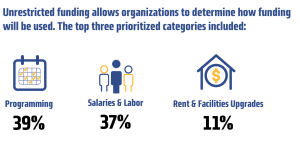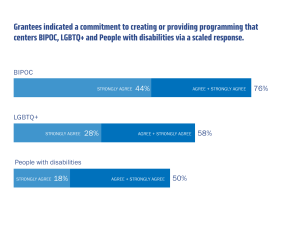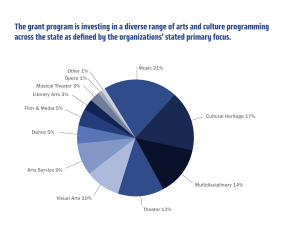Download a PDF of this release.
For Immediate Release
April 4, 2023
Contacts: Calandra Childers, VP of Strategic Initiatives & Communications,
206-788-3051, calandrachilders@artsfund.org
More than $10 million awarded to 671 Washington State arts and culture organizations through the Community Accelerator Grant program
Administered by ArtsFund and funded by the Paul G. Allen Family Foundation, the program prioritized organizations that represent and support BIPOC, LGBTQ+, people with disabilities, and rural communities across Washington State
SEATTLE – Today, ArtsFund and the Paul G. Allen Family Foundation announced the 671 grantees of the Community Accelerator Grant, a historic investment in Washington’s arts and culture sector. Administered by Arts Fund and funded by the Paul G. Allen Family Foundation, the program provides just over $10M in $2,500 to $25,000 grants across Washington state. The distribution comes just six months after the partnership was announced, in response to the continued sector need. Funding will provide essential resources to Washington organizations whose primary mission is to produce or support arts and culture activities. The unrestricted funding will boost arts organizations’ ability to invest in their missions and essential roles serving communities across the state.
“We are so proud to highlight the breadth and depth of Washington’s rich cultural landscape, and celebrate the leadership and vision of the Paul G Allen Family Foundation in funding this program,” said ArtsFund CEO and President, Michael Greer. “Our hope is that their philanthropy inspires others to continue to invest in this sector, and see how possible it is to make an investment that is meaningful, equitable, and expeditious.”
Grants were awarded to every eligible organization that applied, with an average award of $14,909. The total funding pool of $10M responds to approximately two-thirds of total requested funds. Nearly 70% of the grantees reported annual budgets of less than $500,000. Organizations in 35 of Washington’s 39 countries are included.
“This community-driven model distributes urgently needed capital quickly, equitably, and efficiently to arts and culture organizations that are so important to a vibrant, healthy community,” said Lara Littlefield, executive director on behalf of the Paul G. Allen Family Foundation. “We are heartened by the diversity and geographic reach of this program as well as the speed and efficiency in which it was administered thanks to ArtsFund and the Community Advisory Panel.”
The Community Accelerator Grant program prioritized funding to communities that are underrepresented in other funding programs – specifically, in rural communities, and for BIPOC, LGBTQ+, and people with disabilities. The application was designed to be low-barrier, with the goal that no organizations would find it too complicated, or that the information requested was too cumbersome. All eligible applicants received a grant.
Applicants were asked to what degree they felt that this grant might positively impact their ability to build capacity and increase their sustainability. Organizations reported anticipating an additional $2 raised for every $1 of their grant. Representation of priority populations was an important consideration for the program. More than half of the grants are to organizations with a minimum 25% BIPOC representation on both Board and staff.
See the complete list of grant recipients HERE.
Community Advisory Panel
The program was informed by a Community Advisory Panel who advised ArtsFund on the application design, outreach, evaluation and outcome. Panelists included:
● Beth Takekawa, Wing Luke Museum of the Asian Pacific American Experience (retired)
● Ginger Ewing, Terrain
● Jane Broom, Microsoft Corporation
● Karen Hanan, ArtsWA (Washington State Arts Commission)
● Katie Carter, Pride Foundation
● Lorin Schmit Dunlop, M. J. Murdock Charitable Trust
● Manny Cawaling, Inspire Washington
● Michael Greer, ArtsFund
● Molly Sanchez, Innovia Foundation
● Shelly Wynecoop, Spokane Arts
● Stephanie Ellis-Smith, Phila Engaged Giving
● Troy Coalman, Wellspring Family Services
ArtsFund considered applications based on a representation of and centering of BIPOC, LGBTQIA+ and people with disabilities, geographic location, and on the reported potential impact of the grant on the organizations’ fundraising.
Grant funds are unrestricted and may be used as each organization self-determines. Grant recipients cite the top uses for funding, in order of priority, include salaries and labor; programming; rent, mortgage and facility upgrades; personal protective equipment and COVID preparedness; and communications and marketing, with more than 80% of organizations citing salaries and labor, and programming as their top needs.
The initiative follows two and a half years of pandemic impacts on the arts and culture sector, which experienced drops in revenue, challenges with reopening logistics, audience hesitation to return to pre-pandemic levels of cultural participation, and workforce impacts, as detailed in ArtsFund’s COVID Cultural Impact Study: ArtsFund.org/CCIS that was partially funded by the foundation. This $10 million investment in the sector responds directly to the study’s recommendations to expand and sustain support for arts and culture organizations as a strategy for social impact, and to provide unrestricted funding in support of the long-term adaptation of the industry.
To receive updates from ArtsFund and find out about future opportunities, please sign up for ArtsFund Newsletter | ArtsFund
# # #
About ArtsFund
ArtsFund supports the arts through leadership, advocacy, and grantmaking in order to build a healthy, equitable, and creative Washington. Founded in 1969, the Seattle-based nonprofit has been building community through the arts for more than 50 years. ArtsFund was originally founded to bring corporate and civic leaders together to help establish and sustain our region’s arts and cultural institutions. Over its grantmaking history, ArtsFund has supported more than 650 arts organizations with more than $100 million in grants, and provided valuable leadership and advocacy. Learn more at www.artsfund.org.
About Paul G. Allen Family Foundation
Founded in 1988 by philanthropists Jody Allen and the late Paul G. Allen, co-founder of Microsoft, the foundation invests in communities across the Pacific Northwest to enhance the human experience of arts & culture, center under-served populations, and mobilize young people to make impact. In addition, the foundation supports a global portfolio of nonprofit partners working across science and technology solutions to protect wildlife, preserve ocean health, and create lasting change. The foundation also funds the Paul G. Allen Frontiers Group, which works to advance cutting-edge research in all areas of bioscience. Learn more at www.pgafamilyfoundation.org.
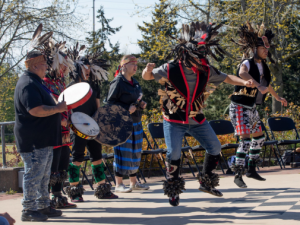
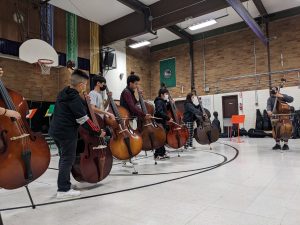
Community Accelerator Fast Facts
The Community Accelerator Grant, administered by ArtsFund and funded by the Paul G. Allen Family Foundation, is providing $10M in unrestricted grants to 671 cultural nonprofit organizations across Washington state in amounts of $2,500 to $25,000. The program prioritized communities with less access to mainstream funding, including organizations who center BIPOC, LGBTQ+, and people with disabilities, and rural communities. The funds will boost arts organizations’ ability to invest in their missions and support essential roles serving communities across the state.
Fast Facts
● A total of $10M has been awarded to 671 organizations
● 100% of eligible applicants received a grant
● Grants range from $2,500 to $25,000 and are unrestricted (meaning they can be used for anything)
● The average grant size is $14,909
● The program was informed by a Community Advisory Panel who advised ArtsFund on the application design, outreach, evaluation and outcome, and included 12 panelists from across the state.
● Grantees anticipate a 2:1 revenue generation for every $1 of their grant, resulting in a potential program impact of $30 million.
Representation of Centered Populations
The Community Accelerator Grant process was developed to support cultural organizations without equal access to mainstream funding, including, rural communities, and organizations serving BIPOC, LGBTQ+, and people with disabilities. In order to measure the degree to which organizations are serving those various communities, the application asked for geographic location, representation of centered populations on staff and Board, and programming focus.
Organizations in 35 out of Washington’s 39 counties received funding, representing 98% of the state’s population.
The following percentage of applicants responded with either “strongly agree” or “agree” to the prompt “Our organization creates and provides programming centering the following communities”:
● BIPOC: 76%
● LGBTQ+: 58%
● People with Disabilities: 50%
Washington’s Arts and Cultural Organizations
● 69% of grantees reported their annual budget at less than $500K.
● 28% of those groups had a budget between $25,000 and $100,000
● Of the 12 discipline options, the top five ranked include Music, Cultural Heritage, Multidisciplinary, Theater, and Visual Arts.
● Organizations cite the top uses for funding, in order of priority, include salaries and labor; programming; rent, mortgage and facility upgrades; personal protective equipment and COVID preparedness; and communications and marketing, with more than 80% of organizations citing salaries and labor, and programming as their top needs.
● More than $72 billion in value was added to the Washington State economy through the arts in 2021, representing the highest percentage in the nation, at 10.8% of the State’s economy according to recently released data from the National Endowment for the Arts.

